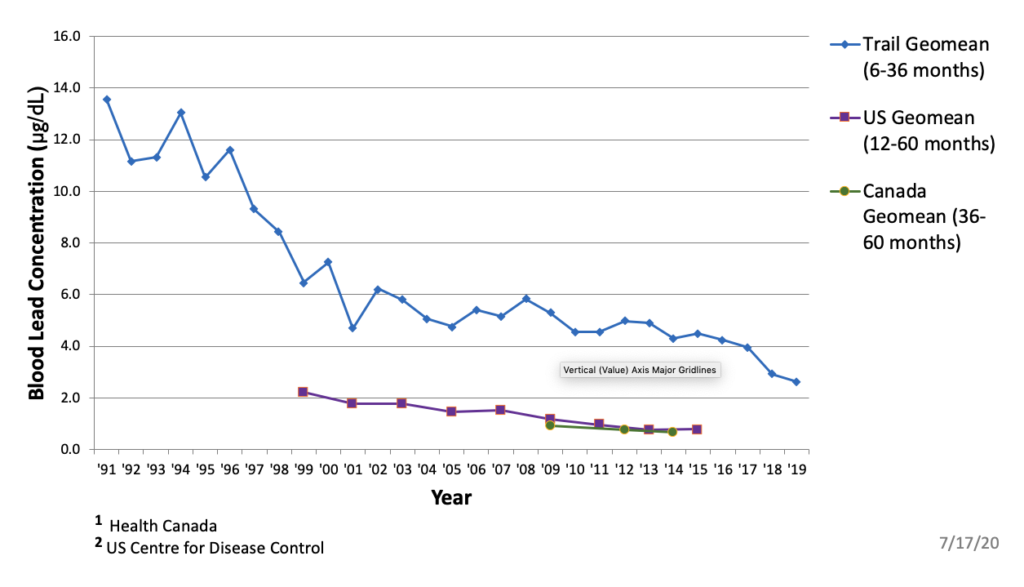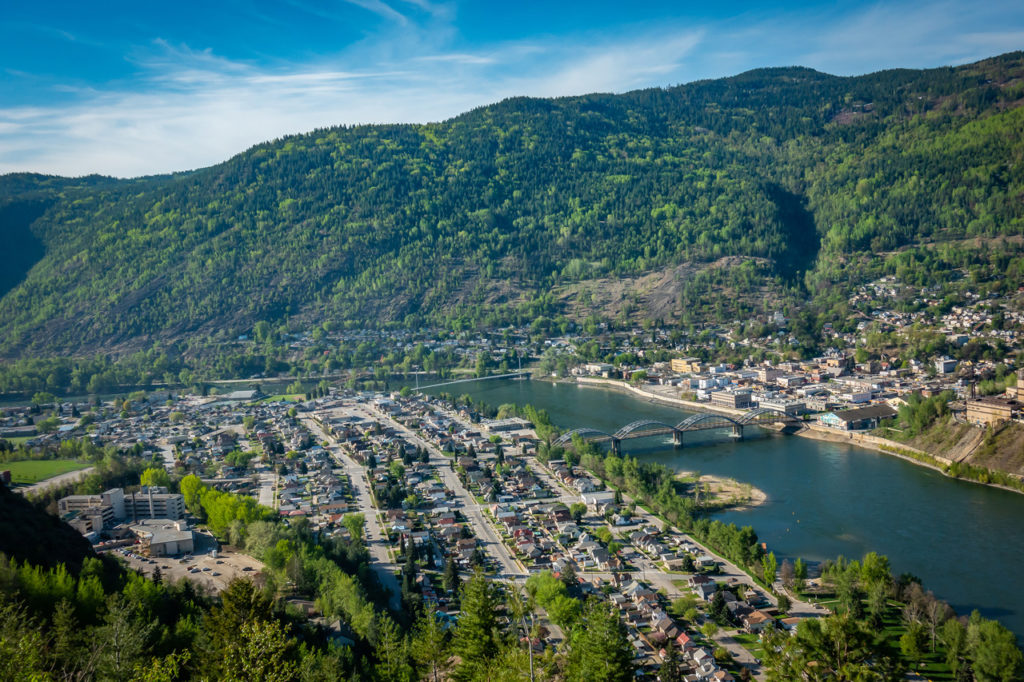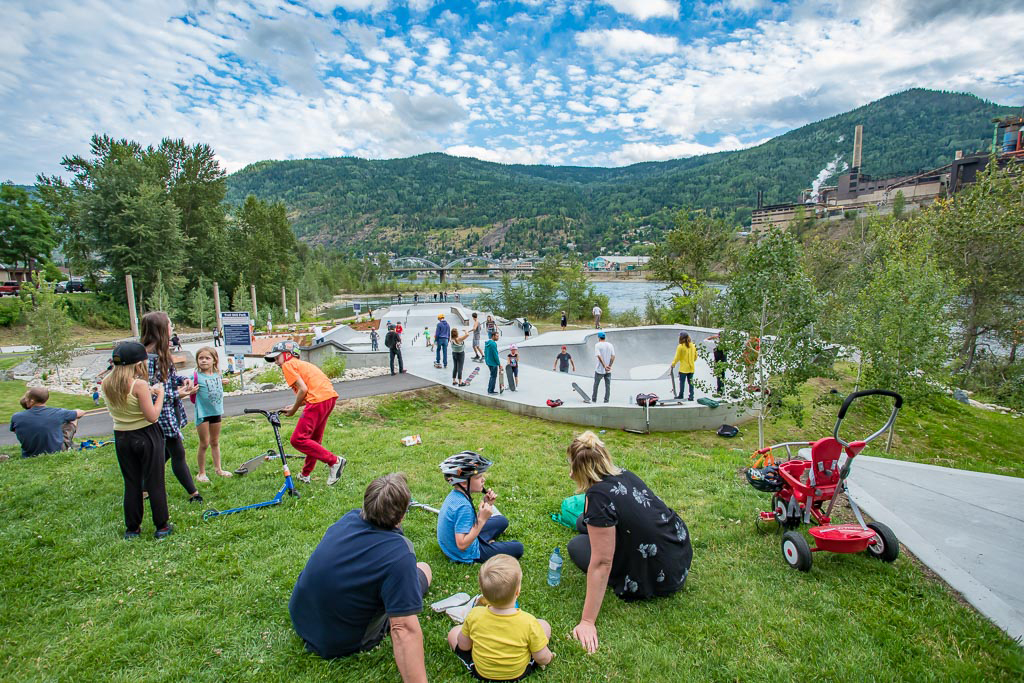Our program has been working with Trail area families since 1989. Blood lead levels in Trail pre-school children have dropped significantly, from an average of 13.5 in 1989 to less than 3 micrograms per decilitre (µg/dL) since 2018.



The smelter is a major employer and economic driver for people living in Trail and the surrounding areas. Over the past 30 years, operational environmental improvements have greatly reduced smelter emissions. As a result of historical emissions, lead and other metals remain in dust and soil in the Trail area. Lead is a naturally occurring element found in small amounts in the earth’s crust, and was commonly used in products such as paint and gasoline. Traces of lead can be found everywhere.
Have you had your soil tested?
Sign up here.
Renovating?
Learn about our lead safe renovation program.
New to Trail?
Download our brochure.
Have a young family?
Book a home visit.
Young children, especially those younger than 3 years old, are at a higher risk for lead exposure and its effects because:
Learning about possible sources of lead and how you and your child might be exposed can help you take action to reduce any risk.
Primary prevention is the most effective way to prevent lead exposure. Actions you can take to reduce the risk of lead exposure include:
Secondary prevention including blood lead testing and follow-up minimizes further exposure. Trail offers an annual voluntary blood lead testing clinic for children under five years old.
Trail Area Health & Environment Program (THEP) is designed to help you keep your children and family healthy and safe. Sign up for a FREE Healthy Families Healthy Homes visit at thep.ca or by calling 250-368-3256. Supports offered by signing up can include:
Trail is home to one of the world’s largest lead and zinc smelting and refining facilities. Historical smelter emissions along with leaded gasoline and lead-based paint have also left legacy lead in the environment. Lead exists in all communities; however, there is more lead in Trail than a town without a lead smelter.
Low levels of lead exposure during the very early years can have impacts on children’s intelligence and attention. We also know that many things in a child’s environment can influence brain development (such as stress, trauma, nutrition, play, exploration, and nurturing).
The Trail Area Health & Environment Program (THEP) offers resources and supports to families who are expecting or have young children.
Yes, it is safe to live in Trail and the surrounding areas. Trail has an operating smelter with a robust environmental monitoring program that has demonstrated significant air emissions improvements over time. THEP continues to work on the effects of historical emissions and support people in the community to reduce exposure.
The most effective way to reduce children’s potential ingestion of lead is to keep indoor dust down. Connect (or reconnect) with the public health nurse and community program office for a home visit to look more closely at nutrition, diet and the home and yard environment. They will connect with you community resources and groups that support early childhood development. They can also provide useful supplies to keep dust down in the home environment, such as a vacuum (or replacement bags), dust buster kits, hand soap, and lead-safe renovation supplies.
Families with children under 12 months are offered a free Healthy Families home visit. A public health nurse will meet with parents to answer their questions and show simple ways to promote children’s health and wellbeing, and reduce lead exposure. Young children in Trail, Casino, Oasis, Rivervale, Waneta and Warfield are invited to have their blood lead levels tested each year starting from the age of 6 months to 36 months.
All programs are voluntary.
The Healthy Families Healthy Homes Program is an in-home visitation, health promotion program targeting expectant families and families with children under 3 years old in Trail, Casino, Oasis, Rivervale, Waneta and Warfield. This is a time when children are more at risk of exposure to lead in their home environment as they are beginning to crawl, explore their world and put hands and objects in their mouths.
Each family receives two visits, one from an Interior Health Public Health registered nurse (the Healthy Families visit) and one from a trained Community Program Office professional (the Healthy Homes visit). Visits focus on prevention of lead exposure and strengthening children’s healthy development through education, awareness and supplies to help parents take action immediately.
Every year, THEP offers free voluntary testing of blood lead levels for children from the age of 6 to 36 months living in Trail, Casino, Oasis, Rivervale, Waneta and Warfield. Children up to 5 years old from other Lower Columbia communities are welcome to attend. Clinics are typically held in September with a follow-up clinic in February.
Please contact the Interior Health Public Health nurse for details. Call 250-364-6223 or text 250-231-5945.
Blood lead levels vary year to year depending on where the child is spending their time (home, daycare, and outdoor play), their behaviour (crawling, hand to mouth activity) and their nutritional status (wide range of healthy foods, adequate iron stores). Blood lead testing ensures that children with elevated blood lead levels are identified and provided follow-up care. As a community, blood lead testing also helps monitor our overall progress in reducing lead exposure in the community. As lead can come from many sources, even if your home received soil management, you should continue to test your children’s blood each year.
Risks from metals other than lead have been studied in Trail through human health risk assessment. The most recent study concluded that the risk from metals other than lead is very low to negligible, and that lead reduction should continue to be the main focus for THEP programs. Ongoing emissions reductions, along with soil management activities, are further reducing levels of metals in the Trail environment. Trail area health statistics have been reviewed by the B.C. Cancer Agency and Ministry of Health. They have not found evidence of increased rates of disease due to metals in the environment.
Home grown fruit and vegetables offer many benefits. Local studies show produce may contain metals from soil and dust, with some veggies more likely to have higher levels. Homeowners can receive soil testing, exterior paint testing for lead, and, where needed, soil management for their yard. Vegetable gardens are prioritized for soil testing and soil management.
Have your soil tested!
Always wash fruits and vegetables before eating.
Amend your soil to help reduce metal uptake.
Wash your hands (and your children’s hands) after working in the garden.
The fruit parts of plants (e.g. tomatoes, cucumbers, berries, beans, etc.) have the lowest metals.
Leafy greens and root veggies are likely to have higher levels of metals
Wash leafy greens thoroughly. Washing gets rid of some, but not all of the metals.
Peel root vegetables before eating.
THEP has a regular newsletter that is delivered twice a year by Canada Post to residences in Trail, Casino, Oasis, Rivervale, Waneta and Warfield. The newsletter helps keep local families up-to-date on events, news, and programs in the area. If you would like to request a PDF version of the newsletter be sent to you by email, please fill out the form below. We won’t share your email address with anyone.
Copyright 2024 Trail Area Health & Environment Program. All Rights Reserved.